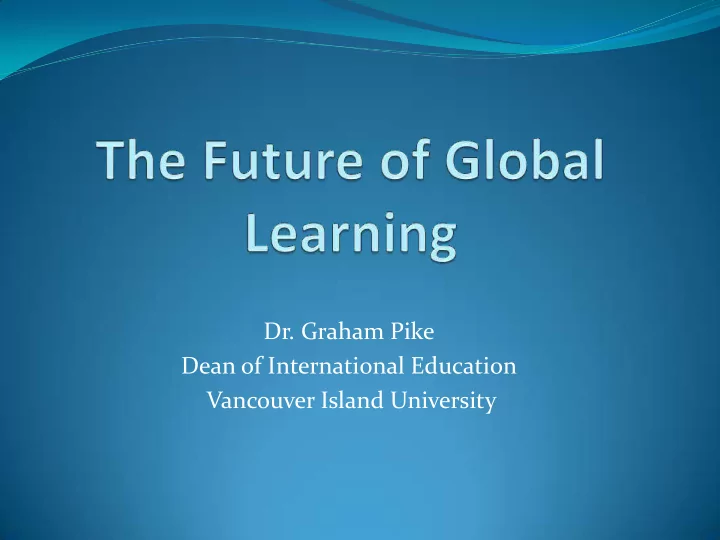

Dr. Graham Pike Dean of International Education Vancouver Island University
What is global learning? 1. 2. Problematic concept of global citizenship 3. Nurturing global learners – six recommendations for individuals and institutions
Lark Rise: a village in England in the 1880s “Lark Rise to Candleford ”, by Flora Thompson
view of the world limited travel outside community food, clothing locally produced home-based employment limited expectations of life basic education
Shahkooh: a village in Iran in 2013
view of the world limited travel outside community food, clothing locally produced home-based employment enhanced expectations of life potential for advanced education potential for global learning
The real voyage of discovery consists not in seeking new landscapes but in having new eyes Marcel Proust
The Council for Education in World Citizenship (CEWC) – an inauspicious beginning Some progress made since 1939: • Understanding conflict resolution • Frameworks for rights and responsibilities • Environmental awareness • Reduction in global poverty • Cosmopolitanism • Gender equity • Proliferation of civil society organizations
Not achieved: a truly global perspective We don’t live in the ‘global village’ ( Ignatieff) • Not rooted in our fundamental belief systems • Not embedded within our values frameworks • Does not influence consumer choices • Does not influence voter choices The global village has no address
Lessons from history: we tend to ignore the unfamiliar and the uncomfortable . Have we learnt the lesson? ‘ We are global citizens with tribal souls’ Piet Hein
A definition of global citizenship “Global citizenship empowers individual human beings to participate in decisions concerning their lives, including the political, economic, social, cultural and environmental conditions in which they live. It includes the right to vote, to express opinions and associate with others, and to enjoy a decent and dignified quality of life. It is expressed through engagement in the various communities of which the individual is a part, at the local, national and global level. And it includes the right to challenge authority and existing power structures – to think, argue and act – with the intent of changing the world. ” Michael Byers
Why is global learning important? The world we live in … • Rising population, declining natural resources • Food sources and water supplies under threat • Rapid species loss and damage to ecosystems • Changing climate, major impacts on most vulnerable • Growing divide between richest and poorest • Access to basic education and health care denied • Human rights routinely abused
Two conflicting ideals: ‘ development’ versus ‘equity’ Education’s moral imperative: to empower students ‘ to think, argue and act with the intent of changing the world ’.
Develop proficiency in ‘global thinking’ 1. Seeing the ‘big picture’ Thinking long term Connecting the disciplines De-standardizing learning - challenging the rebirth of ‘ Mr Gradgrind ’
Foster critical global literacy 2. Critically assessing decisions and actions from justice and equity perspectives Understanding long-term impacts of colonization and oppression Understanding that globalization has unequal benefits Understanding multiple impacts of actions and decisions
3. Develop appreciation for complexity and ambiguity Critiquing ‘right answers’ Covering less, learning more Building tolerance for ambiguity Finding comfort in messiness The true value of knowledge is that it makes our ignorance more precise. - Anne Michaels
4. Expand our vision of citizenship ‘ … give the circle that defines our humanity special attention and respect’ (Nussbaum ) Embracing multiple citizenships Resolving conflicting loyalties Fostering a shifting identity
‘ I think this experience has definitely changed me. I think with knowledge comes a certain responsibility, and after being in Africa I feel a strong responsibility to help in some way. I no longer have the excuse to do nothing because I don ’ t know “ how ” …. And this alone is motivating enough. ’ SIE participant, Kenya, 2005
5. Take personal responsibility and local action Understanding the necessity of participation Seeking out ‘conspirators’ Pursuing the path of the ‘practical visionary’
‘Crowdsourcing’ – a promising trend in civic engagement Examples: Harrassmap (Egypt) Gang-rape trial (India) Arab Spring ‘Occupy’ movement ‘Idle No More’ (Canada) Avaaz
6. Commit to building a ‘global moral community’ (Dower) Giving priority to global literacy Fostering community engagement Modeling responsible and sustainable action Illustrating education as transformation
Why is a ‘global moral community’ important to international educators? Pivotal role of educational institutions Other visions/versions of reality Demonstrate preferred visions Encourage constructive participation Illustrate power of collaborative action
‘Education is the point at which we decide whether we love the world enough to assume responsibility for it and by the same token save it from that ruin which except for renewal, except for the coming of the new and the young, would be inevitable. ’ Hannah Arendt
The future of global learning
Comments and Questions? Graham.Pike@viu.ca
Recommend
More recommend